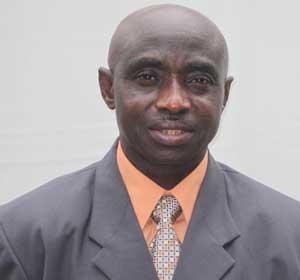
Dr. Francis Adu-Febiri is an African-Canadian born and raised in Ghana, West Africa. He holds a Sociology BA (Honours) degree from the University of Ghana, an MA in Sociology from Simon Fraser University, and a sociology PhD from the University of British Columbia, Canada. His MA thesis and PhD dissertation were on tourism in the contexts of globalization processes and responses to poverty and inequitable diversity. He is a sociology professor and former chair of the Social Sciences Department at Camosun, Victoria, BC. Currently he is the Chair of Camosun’s African Awareness Committee (AAC). Francis has been teaching Introductory Sociology, Sociological Theory, Social Science Research Methods, Service-Learning and Global Issues, Introduction to Africa, Indigenous – Settler Relations in Canada, Introduction to Social Science Methodologies, and Indigenous Research Methodologies at Camosun for many years. He combined teaching sociology at Camosun with teaching at the University of Victoria where he taught courses on racialization & Ethnicity, Diversity, and Sociology of Leisure. Before teaching at Camosun and UVic, he taught Sociology of Development & Underdevelopment at the University of British Columbia and Social Theory and Ethnic Conflict at Simon Fraser University. In addition, he has been an affiliate of the Faculty of Graduate Studies, University of Victoria, for many years serving on MA and PhD committees. From 2007 to 2012, Francis was appointed an adjunct professor at Simon Fraser University to serve on a PhD committee in the Faculty of Education. He has also supervised a Master’s Thesis at Royal Roads University, Victoria, BC. Adu-Febiri served as the external reviewer of the sociology program at the University of Guam and a tenure promotion at University of Zimbabwe and Grant MacEwan University in Alberta, Canada.
Francis’ teaching focuses on applied learning—field schools, creativity and innovation exercises, and service-learning projects—that uses sociological concepts, methods, theories/paradigms to inspire, equip, and empower students to engage in integrated thinking (synthetic thinking, critical thinking, creative thinking, design thinking, and sustainability thinking) and humanitarian projects to acquire and hone skills/competencies to become changemakers and gamechangers. Using applied learning pedagogy, Adu-Febiri co-founded with Dr. Francis Yee, through teaching a course on Service-Learning and Global issues, the Camosun World University Services Canada (WUSC) program that sponsors students from refugee camps to attend Camosun. Since 2016 seven students from the Democratic Republic of Congo, Malawi, Ethiopia, and Syria have benefited from this innovative program. The funding comes from Camosun Students Society and Camosun International.
Adu-Febiri’s research program focuses on using the Human Factor Competency (HFC) model to decolonize and indigenize poverty reduction programs in the framework of globalization processes, specifically a) tourism development, b) microfinance, c) diversity, and d) education practices in the contexts of the intersectionality of gender, racial, ethnic, and class inequities/inequalities. He has received many research grants to pursue these research interests. He has done many academic presentations at major conferences in Africa, Asia, Australia, Europe, Middle East, North America, and Russia. He has participated in many panel discussions, made presentations at Correctional Institutions in British Columbia and the NHQ of Correctional Services Canada, and has been an expert witness on racism in some of the BC provincial and supreme courts. In addition, Francis has spoken as a key note speaker at Ghanaian – Canadian Association at Vancouver and the Washington State Ghanaian Cultural Association in Seattle. He was the endnote speaker at the CSPT conference at University of Victoria. In November 2022 he was the ECOFIN Keynote Speaker at KAMUN Model United Nations Conference section for the Black Forest Summit on Microfinance and Women’s Empowerment, Karlshurhe, Germany.
His publications in academic peer reviewed journals and book chapters are extensive and focus on the topics of globalization, tourism, diversity, equity/equality, racialization and ethnicity, microfinance, human factor competency development, and Indigenous issues. Adu-Febiri is the author of First Nations Students Talk Back: Voices of a Learning People and also the co-author of Succeeding From the Margins of Canadian Society: A Strategic Resource for New Immigrants, Refugees and International Students. Currently, he is working on two book manuscripts addressing the issues of 1) diversity’s nightmares and social solutions to pandemics and 2) Bad Data and Africa’s Development Challenges. Francis has also been on the editorial committees of academic journals in Canada, USA, England, and New Zealand. He recently peer-reviewed papers on land dispossession struggles in Nigeria for International Sociology, Indigenous research methodologies for the McGill Law Journal, and AlterNative: An International Journal of Indigenous Peoples, which is published by Ngā Pae o te Māramatanga, New Zealand’s Māori Centre of Research Excellence in alliance with SAGE publishing. In addition, he reviews Introductory Sociology and Indigenous Research Methodologies textbook manuscripts for major book publishing companies in Canada.
Francis was the Chair of the Ethno-cultural Advisory Committee of the British Columbia Ministry of Children and Family Development, South Vancouver Island Region, for many years. He also initiated and helped establish the African Heritage Association of Vancouver Island (AHAVI), Victoria, BC. He is the President of the Canadian Chapter of the International Institute for Human Factor Development (www.iihfd.org).
Dr. Adu-Febiri has received excellence awards that include the following: the National Institute for Staff and Organizational Development (NISOD) Leadership Excellence Award, University of Texas at Austin, Camosun Celebrates Excellence Award, Community Impact category, Camosun International Spirit Award, and the Camosun School of Arts & Science Award for Excellence in Research, Innovation and Scholarly Activity.